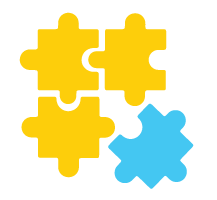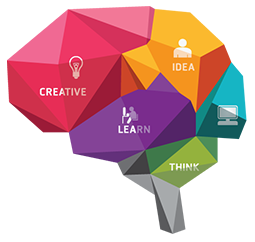Redeem Code
What are Executive Functions ?

Executive functions influence social, emotional, intellectual, and organizational aspects of one’s life. Life can be devastated when executive functions are disrupted. Executive functioning skills help you get things done and These skills are controlled by an area of the brain called the frontal lobe.
“The executive functions all serve a "command and control" function; they can be viewed as the "conductor" of all cognitive skills.”
Executive function is a group of important mental skills and also a critical determinant of a child's adaptive functioning.
These skills fall under three areas of executive function are working memory, Cognitive Flexibility, and inhibitory control:
1. Working Memory
What it is: The ability to keep information in mind and then use it in some way
Example This skill helps us to read a text or phrase, hold on to the information, and then use it to answer questions.
2. Cognitive Flexibility
What it is: The ability to think about something in more than one way
Example This skill helps us to answer a math problem in two ways or to find relationships between different concepts.
3. Inhibitory Control
What it is: The ability to ignore distractions and resist temptation
Example A student might use this skill to keep from blurting out an answer in class. It helps kids regulate their emotions and keep from acting impulsively.
Executive functions are responsible for number skills, including:
Planning and Organization
 Developing and implementing plans to accomplish tasks, including planning ahead and making good decisions.
Developing and implementing plans to accomplish tasks, including planning ahead and making good decisions.
Problem Solving/Flexible Thinking
 Flexible Thinking refers to adjusting behavior to meet circumstances, Including coming up with different ways to solve problems, having many ideas about how to do things
Flexible Thinking refers to adjusting behavior to meet circumstances, Including coming up with different ways to solve problems, having many ideas about how to do things
Focus/Attention on Goals
 Focus and attention is a capacity to attend to a situation or task in spite of distraction, fatigue, or boredom.
Focus and attention is a capacity to attend to a situation or task in spite of distraction, fatigue, or boredom.
Self-Motivation/Self-Starter
 Begins tasks on one’s own, including starting tasks easily, being motivated, and taking the initiative when needed.
Begins tasks on one’s own, including starting tasks easily, being motivated, and taking the initiative when needed.
Self-Management/Self-Control
 Making us thinking about consequences before acting, resisting temptations and not acting impulsively, maintaining self-control, and keeping commitments.
Making us thinking about consequences before acting, resisting temptations and not acting impulsively, maintaining self-control, and keeping commitments.
Self-Awareness
 self-awareness provides abilities, we’re aware of what we do, how we feel (both internally and externally), and sensing what’s happening to us.
self-awareness provides abilities, we’re aware of what we do, how we feel (both internally and externally), and sensing what’s happening to us.
Short Term Memory
 Short Term Memory refers to keeping information in mind that is important for knowing: what to do, how to do it, remembering important things, instructions, and steps.
Short Term Memory refers to keeping information in mind that is important for knowing: what to do, how to do it, remembering important things, instructions, and steps.
Emotions Management
 Emotion Regulation refers to controlling and managing emotions and guiding good behaviors. Good behaviors include, staying calm when handling small problems and reacting with the right level of emotion.
Emotion Regulation refers to controlling and managing emotions and guiding good behaviors. Good behaviors include, staying calm when handling small problems and reacting with the right level of emotion.
Self-Monitoring
 Self-monitoring refers to evaluating one’s own behavior in order to determine when a different approach is necessary.
Self-monitoring refers to evaluating one’s own behavior in order to determine when a different approach is necessary.
How executive function plays a vital role in our day-to-day life?
Executive function helps you:
- Manage time
- Pay attention
- Switch focus
- Plan and organize
- Remember details
- Avoid saying or doing the wrong thing
- Do things based on your experience
- Multitask

Tips to improve Executive Functions
- Enforce Accountability : it’s with timing. With the steps that follow, you can help bolster her executive functions
- Write It Down : Compensate for working memory deficits by making information visible, using notes cards, signs, sticky notes, lists, journals — anything at all
- Make Time External : Make time a physical, measurable thing by using clocks, timers, counters, or apps — there are tons of options!
- Stop to Refuel : Self-regulation and executive functions come in limited quantities. Encouraging frequent breaks during tasks that stress the executive system.
- Practice Pep Talks : You know that locker room pep talk before a big game? Practicing saying “You can do this!” Positive self-statements push people to try harder and put them one step closer to accomplishing their goals.
- Get Physical : Physical exercise has tons of well-known benefits — including giving a boost can help with executive functioning!
Products
Career Plan ‘N’ Insights
Startup Incubator

Cognitive ‘N’ Learning
Recognized by

